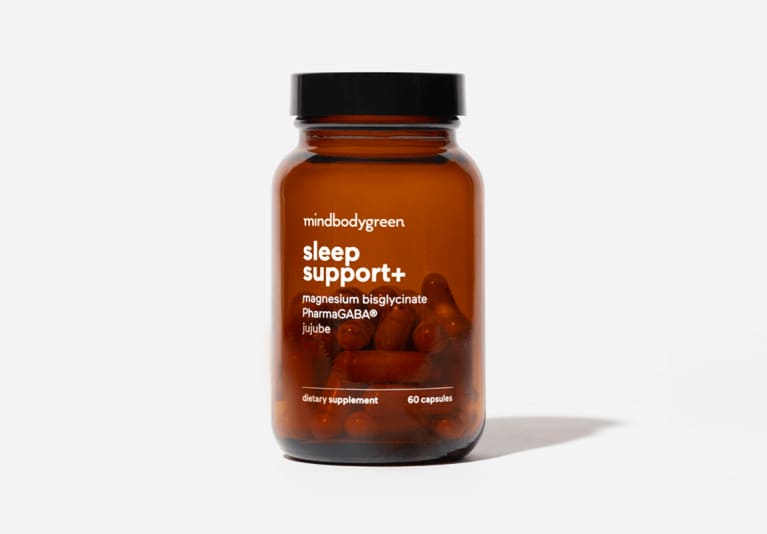
April 20, 2022 — 10:27 AM
Magnesium is required for a whole lot of physiological pathways in the body. The mineral plays a role in healthy blood sugar and blood pressure levels, relaxation and sleep quality, electrolyte balance, muscle and nerve transmission, the transport and actions of other nutrients in the body, and immune system support.* Magnesium is paramount to the health of our bodily structures and functions—from our bones down to the tiny mitochondria in our cells.*
Magnesium is a macromineral, meaning we need much more than trace amounts to keep our bodies running smoothly. But unfortunately, many of us don’t get enough magnesium, especially as we get older.
Why magnesium levels often decline with age.
Getting enough magnesium through diet alone is challenging at any age. Soil depletion in farming has resulted in a steady decline of magnesium in the foods we eat. And food processing results in a loss of the mineral as well, according to a review in the journal Nutrients. These days, over 40% of people in the United States don’t get the recommended daily amount of magnesium through foods.
So what does aging have to do with it? “As a person ages, a big factor in their magnesium decline is that their appetite and [nutrition] intake also decline,” explains Christina Fitzgerald, M.S., R.D., a registered dietitian and sports nutrition expert. “So they’re taking in much less dietary magnesium.”
Plus, aging involves a lot of changes within the body that can simultaneously (negatively) affect magnesium levels: According to functional registered dietitian Alex D’Elia, R.D., changes in urination, intestinal absorption, and bone health status are “three of the most common reasons magnesium insufficiency is seen in the aging population.”
How to maintain healthy magnesium levels for life:
Even if you try your best, dietary changes might not be enough to sustain optimal magnesium levels—this is where a supplement can be useful.
sleep support+
The deep and restorative sleep you’ve always dreamt about*

D’Elia recommends supplementing with magnesium glycinate (also called bisglycinate), which has an added bonus of promoting quality sleep.* There are many different forms of magnesium available, but here are 16 that the mbg team has identified as high-quality.*
If you do take a supplement, follow dosing instructions on the label and check with your physician to make sure it’s safe and effective for you.
2. Check your magnesium status.
Based on blood levels, 12 to 20% of people likely have hypomagnesemia (low magnesium). Even if you don’t have a magnesium deficiency (defined as a serum magnesium level less than 0.75 mmol/L) your body could still be lacking the right amount of this mineral.
As mbg’s vice president of scientific affairs Ashley Jordan Ferira, Ph.D., RDN explains, determining magnesium insufficiency from the blood isn’t so straightforward. “Since serum (blood) magnesium levels are tightly regulated by your kidneys, and most magnesium is actually found intracellularly (aka, inside cells), serum magnesium tests often lie about actual magnesium status,” Ferira shares.
Ferira goes on to say that, “The serum magnesium lab test doesn’t tell the full story for magnesium. A red blood cell magnesium test is considered more accurate.” This fact underscores the importance of partnering with a nutrition-minded healthcare practitioner.
You can up your intake of this essential mineral by making a habit of eating more magnesium-rich foods. “Include a variety of sources daily, such as legumes, nuts, seeds, whole grains, and leafy veggies in addition to fortified cereals and milk and yogurts,” Fitzgerald says. “These can easily be included in both meals and smoothies.”
Our magnesium levels tend to decline with age for several reasons, including normal changes in the body. Although we can always aim to eat more magnesium-rich foods to counteract low levels, getting enough of the mineral from diet alone is tough daily. Taking a supplement can help support your body’s magnesium count for better health at any age.*
If you are pregnant, breastfeeding, or taking medications, consult with your doctor before starting a supplement routine. It is always optimal to consult with a health care provider when considering what supplements are right for you.

sleep support+
The deep and restorative sleep you’ve always dreamt about*
sleep support+
The deep and restorative sleep you’ve always dreamt about*

https://www.mindbodygreen.com/articles/magnesium-with-age






